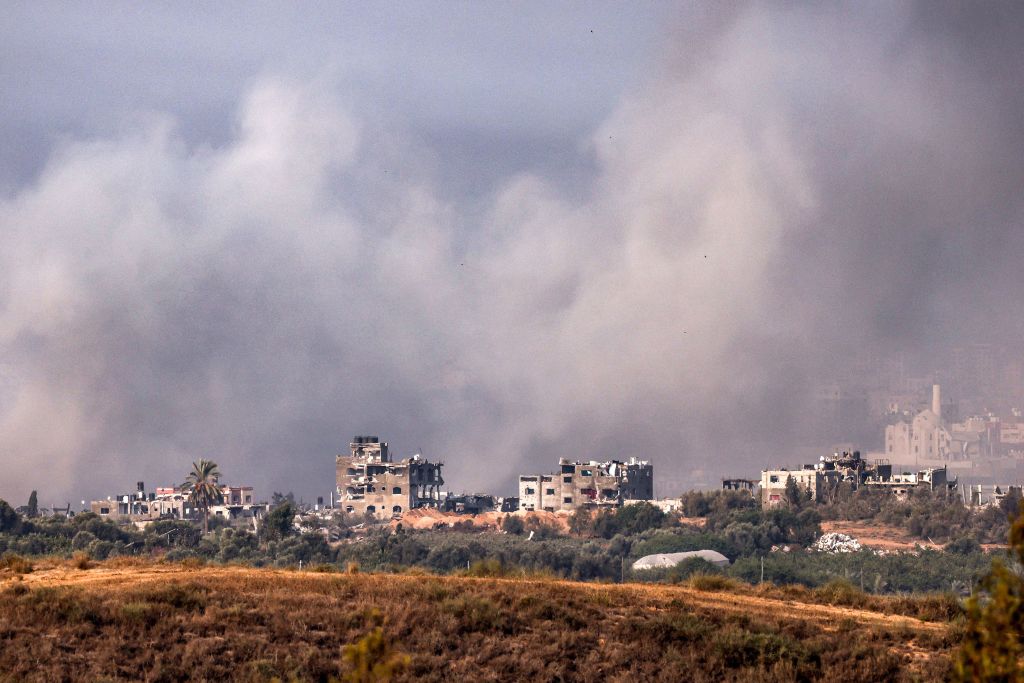It would be a major strategic error for Israel to agree to a ceasefire in Gaza, as some are calling for now. Any let up in air and ground attacks would simply allow Hamas to regroup, rearm and replenish its depleted ranks with new recruits ready and willing to kill women, children and babies the next time the opportunity arises.
Israel’s approach should not just be viewed through the prism of rage or revenge for the atrocity which left 1,500 Israelis dead three weeks ago. The military operation in Gaza is designed to degrade Hamas’s military capability to such an extent that it will take years to recover. The primary objective is to kill or capture Hamas’s high command while also destroying the terrorists’ seemingly endless arsenal of rockets, vast tunnel network and supply routes.
There will come a time for compassion, when Israel should help rebuild Gaza’s bomb-damaged neighbourhoods, hospitals and schools. But not now
Prime Minister Benjamin Netanyahu was right to say that Israel would not agree to a halt in attacks because, he argued, it would strengthen Hamas. ‘Just as the United States would not agree to a cease-fire after the bombing of Pearl Harbour or after the terrorist attack of 9/11, Israel will not agree to a cessation of hostilities with Hamas after the horrific attacks of October 7th.’ He added that ‘calls for a ceasefire are calls for Israel to surrender to Hamas, to surrender to terrorism.’
Imagine the outcry in the UK, for example, if the government had called for a ceasefire with the IRA after the murder of Lord Mountbatten, or the attempted assassination of Prime Minister Margaret Thatcher in the Brighton Hotel Bombing in 1984.
Yoav Galant, Israel Minister of Defence, and a key player in the war against Hamas in 2008-09, was absolutely correct when in the aftermath of the terrorist attack he said Israel would ‘change reality on the ground in Gaza for the next 50 years’.
He added: ‘Fifteen years ago, as head of the Southern Command, I came close to “breaking the neck” of Hamas. I was stopped by the political echelon,’ he said. ‘This phenomenon will not continue.’ Who knows what would have happened if he had been allowed to pursue his military objectives at the time?
One of the reasons why Hezbollah, the Iranian-backed terrorist group, has so far failed to offer any real response to Israel military operations in Gaza is because its commanders know that they will suffer huge losses in both fighters and equipment. Hezbollah took years to recover from the 2006 war with Israel and is in no rush to suffer the same kind of damage if it attempts to open up a meaningful front on Israel’s northern border.
There is also the crucial issue of time. The majority of Israelis probably support the government’s military response but that is only likely to decrease in the coming days and weeks when the Gazan civilian death toll and IDF casualties begin to mount. The potential for a huge loss of life amongst the IDF when the street fighting proper begins is huge.
Two weeks of heavy Israeli losses could very quickly change opinion. There is also the impossibly tricky subject of the fate of the 230 Israeli hostages still held by Hamas. This is where the importance of having strong and ruthless leaders comes into its own. The invasion of Gaza is not and must never become a hostage rescue mission – that would amount to dancing to Hamas’s tune.
Professor Michael Clarke, a Distinguished Fellow at Royal United Services Institute believes that while publicly Netanyahu says his government has two objectives – to destroy Hamas and to save the hostages – in reality this is not the case.
‘He (Netanyahu) puts those objectives as if they are equal but of course they are not. The objective of saving the hostages is very much subordinate to the need to destroy Hamas. There is a cruel logic to that which for political reasons he cannot say.’
Just as a boxer doesn’t allow his opponent a breather when he has him on the ropes, Israel must continue landing blow after remorseless blow until a knockout is achieved or Hamas submits.
War is a nasty business and the battlefield is no place for the faint-hearted. There will come a time for compassion, when Israel should look to help in rebuilding Gaza’s bomb-damaged neighbourhoods, hospitals and schools. But not now.
Israel needs strong politicians and even stronger generals, who must be utterly ruthless in pursuit of their mission – because to do otherwise would simply guarantee the continuation of Hamas’s atrocities.








Comments
A blooming good offer
Join the conversation with other Spectator readers by getting the next 3 months for £3.
CLAIM OFFER 3 months for £3Already a subscriber? Log in